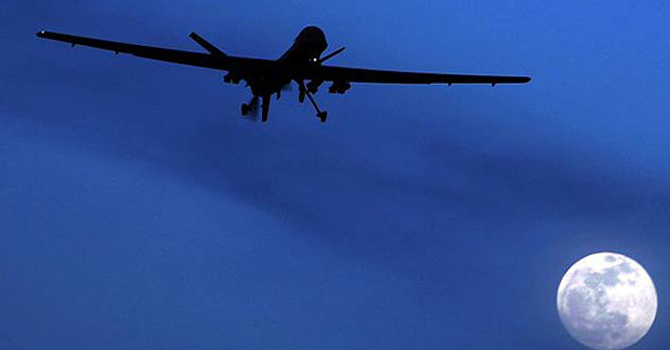
WASHINGTON: After a decade of costly conflict in Iraq and Afghanistan, the American way of war is evolving toward less brawn, more guile.
Drone aircraft spy on and attack terrorists with no pilot in harm’s way.Small teams of special operations troops quietly train and advise foreign forces. Viruses sent from computers to foreign networks strike silently, with no American fingerprint.
It’s war in the shadows, with the US public largely in the dark.
In Pakistan, armed drones, not US ground troops or B-52 bombers, are hunting down al Qaeda militats, and a CIA-run raid of Osama bin Laden’s hide-out was executed by a stealthy team of Navy Seals.
In Yemen, drones and several dozen US military advisers are trying to help the government tip the balance against an al Qaeda offshoot that harbors hopes of one day attacking the US homeland.
In Somalia, the Horn of Africa country that has not had a fully functioning government since 1991, President Barack Obama secretly has authorized two drone strikes and two commando raids against terrorists.
In Iran, surveillance drones have kept an eye on nuclear activities while a computer attack reportedly has infected its nuclear enrichment facilities with a virus, possibly delaying the day when the US or Israel might feel compelled to drop real bombs on Iran and risk a wider war in the Middle East.
The high-tech warfare allows Obama to target what the administration sees as the greatest threats to US security, without the cost and liabilities of sending a swarm of ground troops to capture territory; some of them almost certainly would come home maimed or dead.
But it also raises questions about accountability and the implications for international norms regarding the use of force outside of traditional armed conflict.
The White House took an incremental step Friday toward greater openness about the basic dimensions of its shadowy wars by telling Congress for the first time that the US military has been launching lethal attacks on terrorist targets in Somalia and Yemen.
It did not mention drones, and its admission did not apply to CIA operations.
“Congressional oversight of these operations appears to be cursory and insufficient,” said Steven Aftergood, an expert on government secrecy issues for the Federation of American Scientists, a private group.
“It is Congress’ responsibility to declare war under the Constitution, but instead it appears to have adopted a largely passive role while the executive takes the initiative in war fighting,” Aftergood said in an interview.
That’s partly because lawmakers relinquished their authority by passing a law just after the Sept 11 terrorist attacks that essentially granted the White House open-ended authority for armed action against al Qaeda.
Secret wars are not new.
For decades, the CIA has carried out covert operations abroad at the president’s direction and with congressional notice. It armed the mujahedeen in Afghanistan who fought Soviet occupiers in the 1980s, for example.
In recent years the US military's secretive commando units have operated more widely, even in countries where the US is not at war, and that's blurred the lines between the intelligence and military spheres.
In this shroud of secrecy, leaks to the news media of classified details about certain covert operations have led to charges that the White House orchestrated the revelations to bolster Obama's national security credentials and thereby improve his re-election chances.
The White House has denied the accusations.
The leaks exposed details of US computer virus attacks on Iran’s nuclear program, the foiling of an al Qaeda bomb plot targeting US aircraft, and other secret operations.
Two US attorneys are heading separate FBI investigations into leaks of national security information, and Congress is conducting its own probe.
It’s not just the news media that has pressed the administration for information about its shadowy wars.
Some in Congress, particularly those lawmakers most skeptical of the need for US foreign interventions, are objecting to the administration’s drone wars.
They are demanding a fuller explanation of how, for example, drone strikes are authorized and executed in cases in which the identity of the targeted terrorist is not confirmed.
“Our drone campaigns already have virtually no transparency, accountability or oversight,” Democratic Rep Dennis Kucinich and 25 other mostly anti-war members of Congress wrote Obama on Tuesday.
A few dozen lawmakers are briefed on the CIA’s covert action and clandestine military activity, and some may ask to review drone strike video and be granted access to after-action reports on strikes and other clandestine actions.
But until two months ago, the administration had not formally confirmed in public its use of armed drones.
































